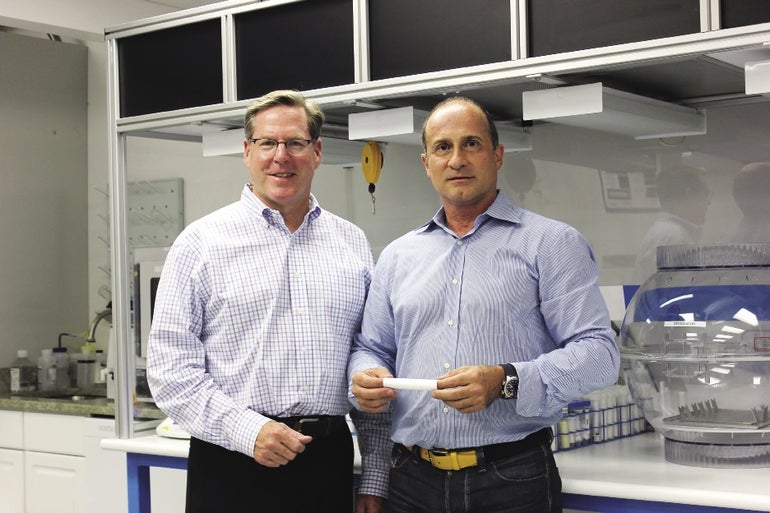With the threat of NASDAQ delisting looming, executives at Holliston-based Biostage Inc. are looking for new ways to finance the continued development of its regenerative platform that’s successfully regenerated the esophaguses of laboratory pigs.
Biostage CEO Jim McGorry said in a June 1 interview the company is in discussions with potential partners, including investors and companies, “that really see where we’re going… to try to take us to the next level.”
An early-stage company founded in 2007 that’s performing preclinical trials in animals and hopes to begin clinical trials in humans by the end of the year, Biostage may even be looking for a company to acquire it.
“It’s a spectrum of scenarios,” McGorry said.
Being scooped up by a larger biopharmaceutical company would give the 22-employee Biostage the steady stream of financing needed to proceed with commercialization of its Cellframe technology, a biocompatible synthetic scaffolding platform showing promise in the area of regenerative medicine for hollow organs, including the esophagus, bronchus and trachea. McGorry said Biostage will examine other options first, starting with finding new investors.
“Strategically, all options are open to us, and we’re dialoguing on a broad spectrum of alternatives,” said McGorry, who declined to name the companies or investor groups Biostage is in talks with.
In addition, executives are talking with companies in Asian markets about the potential for inking licensing and distribution agreements, as well as launching clinical trials. Asia is a prime place to look for new opportunities because the rate of esophageal cancer is 10 times higher than Western countries, due largely to diet, and in Japan, the regulatory environment is very favorable to regenerative medicine.
A critical moment
Saverio La Francesa, the company’s chief medical officer, said Biostage is past the proof-of-concept moment, having achieved orphan drug status from the U.S. Food and Drug Administration for its Cellspan Esophageal Implant, giving it protection from competitors for seven years as the firm works to bring it to market.
“We’re in that critical moment, going from preclinical to clinical,” McGorry said. The Cellspan Esophageal Implant is the first product Biostage is trying to commercialize, for use in patients with conditions related to congenital birth defects and esophageal cancer. The implant regenerates esophageal tissue using the patient’s own cells, providing an alternative to complex surgeries with high rates of complications.
La Francesa said regenerative therapies using scaffolding are available for larger organs, but not for yet for hollow organs, making Biostage a pioneer.
Encouraging results
Biostage executives have aggressively presented results at industry conferences in order to attract attention from investors. Despite the positive results – pigs are alive and well a year after receiving the implant – the company’s stock price has tumbled over the last year, falling well below the $1 per share threshold NASDAQ requires for companies to be listed on the market.
NASDAQ threatened Biostage with delisting last fall, giving the firm until May 17 to meet the $1 stock price requirement, and until March 31 to meet a $2.5 million stockholders’ equity requirement. Biostage raised $6.8 million in a stock offering in February to bolster its cash flow, but failed to meet the NASDAQ requirements, resulting in a May 18 letter informing Biostage it would be delisted if the firm didn’t request a hearing.
With enough cash to pay for operations through the end of the third quarter in September, Biostage has requested a hearing and hopes to successfully appeal the delisting this month when the company presents its milestones to the panel. If an appeal is won, the company could receive an extension to meet requirements through Nov. 14.
Laura Engel, an analyst covering Biostage for Dallas, Texas Stonegate Capital Partners, suggested in a June 6 email Biostage’s stock could rebound.
“With the very encouraging data to date and the significant potential behind the Cellframe regenerative technology, I still have faith that with positive news on clinical trials … this issue will be favorably resolved with an escalating share price,” she wrote.
In a report issued in May, Engel wrote she expects the company to reach commercialization by 2021.
According to Christine Finck, a pediatric surgeon who is collaborating with Biostage to study the Cellspan Esophageal Implant’s potential for use in children born with a gap in the esophagus, bringing a product like this to market can’t come soon enough.
Finck said the financial side of the company is outside her purview, but she’s impressed with how well the Cellspan Esophageal Implant has worked in piglets in her lab at Connecticut Children’s Medical Center. She presented data before the American Pediatric Surgical Association in Florida on May 4, and the presentation landed a first-place award because of the results.
“It’s going to make a difference,” Finck said.
Read more

